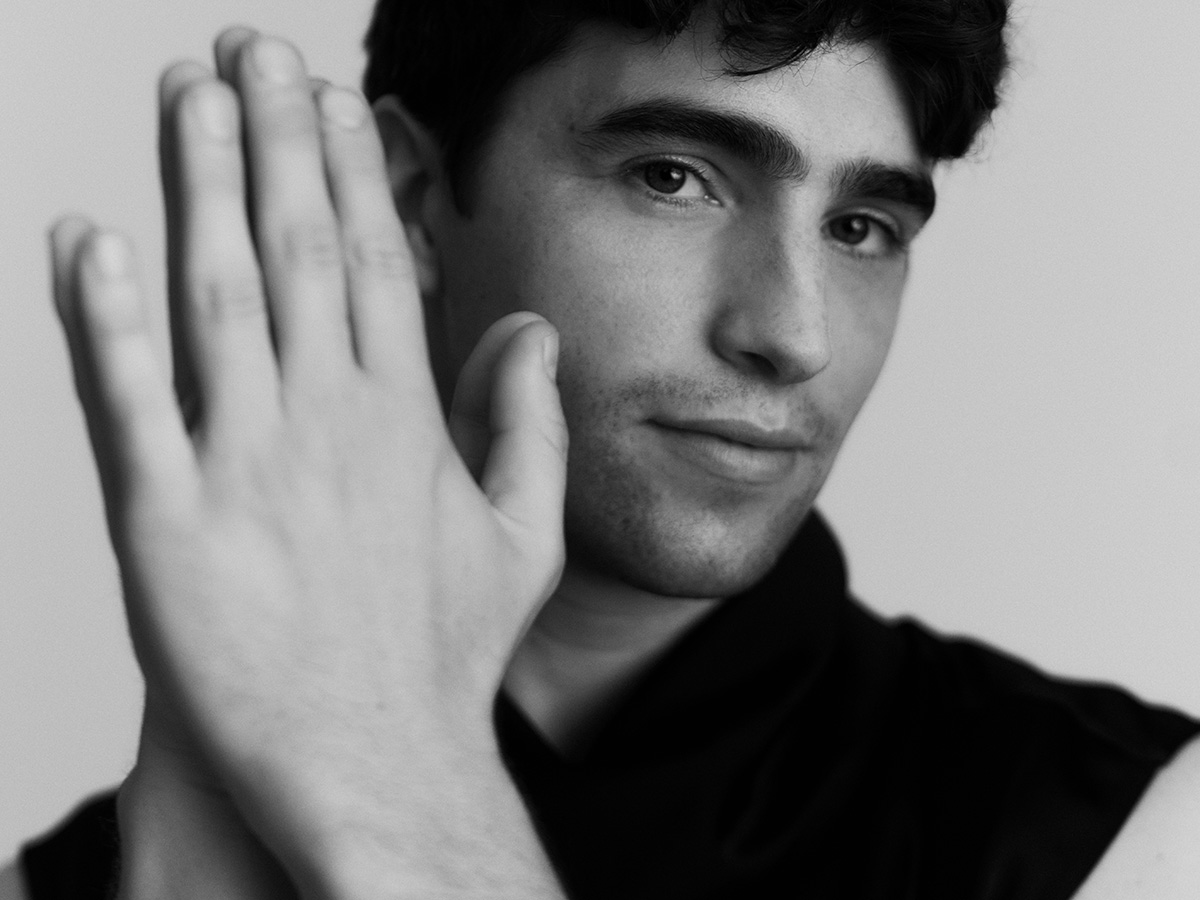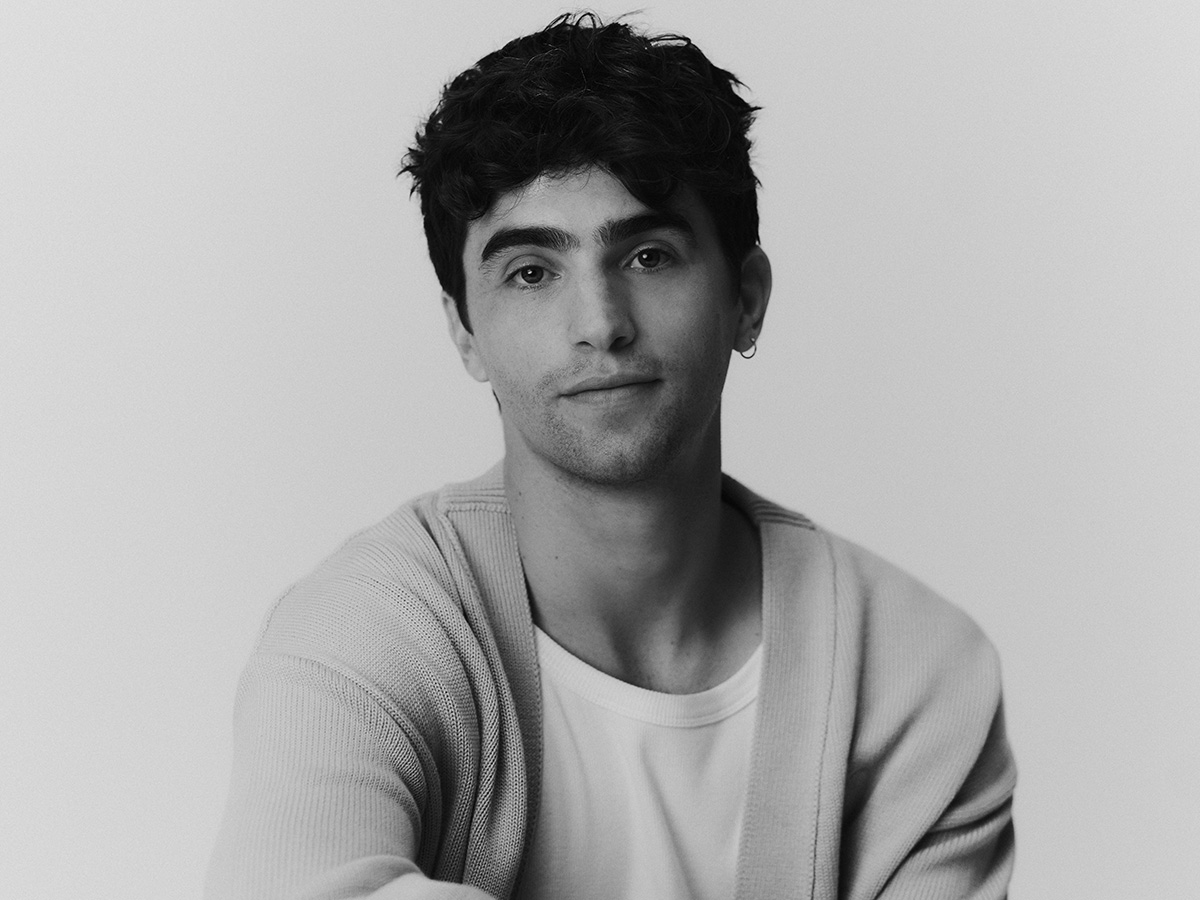
The Untitled Magazine’s Indira Cesarine caught up with George Rexstrew, the charismatic lead of the new Netflix sensation, “Dead Boy Detectives” to chat all about his new role and journey as an actor. The supernatural series, part of the expanding Sandman universe, has captured audiences with its unique blend of mystery, horror, and dark humor. In “Dead Boy Detectives,” George, alongside Jayden Revri, brings to life the characters of Edwin Payne and Charles Rowland—two deceased British teenagers turned spectral sleuths.
In the series, Edwin and Charles, played by George and Jayden, navigate a world filled with supernatural threats, including evil witches, demons, and even Death herself. With the help of a clairvoyant named Crystal, portrayed by Kassius Nelson, the duo tackles some of the most perplexing paranormal cases in the mortal realm. This inventive and darkly comedic take on the classic detective genre promises to keep viewers on the edge of their seats.
George Rexstrew’s rise to fame has been marked by determination and a passion for his craft. Known for his roles in “Findhorn Case 31.08.18” (2023) and an appearance on the “Steve Varley Show” (2016), George’s journey to becoming the lead in “Dead Boy Detectives” is both inspiring and unconventional. Born and raised in London, George’s early fascination with acting was kindled by childhood plays and school productions. Despite initially pursuing a degree in languages at university, his involvement in numerous student plays solidified his decision to pursue acting professionally.
Graduating from the prestigious London Academy of Music & Dramatic Art (LAMDA) in 2020, George faced the unique challenges posed by the COVID-19 pandemic. However, this period also presented unexpected opportunities. Through initiatives like the ‘Actors In Training’ program, George’s talent was recognized, leading to his audition and eventual casting as Edwin Payne in “Dead Boy Detectives.”
In our interview, George shares insights into his character, Edwin Payne, a teenage ghost with over a century of experience. He delves into the duality of playing a character that combines youthful innocence with profound knowledge of the afterlife. To prepare for the role, George immersed himself in the extensive comic book archives that span from 1991 to 2015, watched films that influenced the series’ style, and drew upon his rigorous training at LAMDA. His journey, marked by perseverance, passion, and a bit of serendipity, offers inspiration to aspiring actors and a fascinating glimpse into the making of one of Netflix’s exciting new series.
Indira Cesarine: How did you first get into acting, and what drew you to pursue it as a career?
George Rexstrew: I first got into acting as a kid. I would play teachers with my siblings in our living room and I would ask my mum to buy me red pens from the stationers so I could do some marking… sad, I know. And then my interest in acting itself evolved the fairly usual way. School plays. Drama GCSE and A Level. I decided to study languages at university as they were always my other passion—but during my undergraduate course, I did 30 student plays on the side. And that confirmed I had to pursue acting as a career. Nothing else would make me happy.
What was life like growing up? Where you are from?
I am a London boy. And life was fairly chaotic growing up. I come from a big family—big brothers, a little sister, guinea pigs, rabbits, hamsters, dogs, cats, goldfish. If it had a heartbeat, it lived with us!
Can you walk us through the audition process for landing the role of Edwin Paine in Dead Boy Detectives? What was your initial reaction when you learned you got the part?
My audition process for Dead Boy Detectives was fairly bizarre. I graduated LAMDA in 2020, and therefore lost a lot of public performance opportunities that would usually come with being a drama school finalist. However, as a response to COVID, several casting offices and studios very generously set up initiatives to support our entry into the industry. One of them was Warner Brothers, who established an ‘Actors In Training’ program. I saw the advert on Twitter in May 2020 and applied. Fast forward to September 2021, and they had plucked my self-tape from their archives and emailed me directly, asking me to audition for a character called Edwin Payne. 10 days later, the role was miraculously mine.
Edwin Payne is a complex character who has existed for over a century despite being a teenage ghost. How did you approach portraying that duality of innocence and vast experience?
What a fantastic question. Edwin is indeed complex and that is why it is so much fun to play him. I think it’s a trait all actors crave in their characters. In terms of his vast experience, I did my research into the Edwardian time period and created an imaginative backstory for him. And then when it comes to his innocence, I would say that the writing and other characters helped take care of that. A lot of Edwin’s naivety and vulnerability throughout the series come from being exposed to topics and emotions that would usually go undiscussed: love, sex, and pain. But ultimately I just tried to play these moments beat by beat, scene by scene, episode by episode.

The show deals with mature themes like death, grief, and the supernatural. What kind of research or preparation did you do to tackle your role?
I devoured the archive of comic books that span from 1991-2015, and that was a useful springboard into both the bones of Edwin and the world of the agency. I watched a lot of films that drew parallels to the desired style of our show—Sherlock, Some Like It Hot, Shaun of the Dead, and Attack The Block, for example. I then mined the scripts to glean as clearly as possible the kind of Edwin that was being written for our show. Physically, I leaned on the genius of my LAMDA teachers, such as Lizzie Ballinger, John Baxter, and Gretchen Egolf—absolute titans of actor training in this country—to create as specific a physical life for Edwin as possible. And then vocally, I wanted him to have a clipped, slightly heightened RP. I leaned on my training a lot, actually, and I’m really grateful for it. It was my armor during the filming process. But after having done all this prep, the real challenge was then to kind of let it all go before stepping out onto set, and just try to be as present as possible for every scene.
What did you find most challenging about working on Dead Boy Detectives, and what did you learn from the experience?
This was my first screen role, and I hadn’t appreciated just how technical the medium was. The pilot was especially challenging when it came to that side of things. However, I do love a bit of pressure, and I was flanked by two absolute allies in Jayden and Kassius. If there was ever something I wasn’t sure about, I’d just ask. But by the end of the shoot, I couldn’t get enough of it. With our amazing cast and crew, our film set felt like a very special place to be.
Can you share any memorable behind-the-scenes moments from filming the series?
There are so many. I loved filming all the stunts. The rotating tube carriage was very cool. I felt like I was at a funfair. Oh, and filming Edwin’s flashback during that episode was also amazing. Firstly, because the whole location was dressed as a 1916 boarding school, and I’d never gotten to experience my character’s backstory so viscerally before. But also, the location that was used was an abandoned former mental asylum. And it’s apparently notorious for being haunted still to this day. I managed to sneak off at one point and take a look around. I’ll just say it felt very appropriate for recreating Edwin’s fateful death scene.

What was it like working with the show’s creators, Steve Yockey and Beth Schwartz, and how did they help shape your performance?
Steve and Beth are two total gems. Steve is the one who cast me, so I’ll always be grateful to him. And because he’s a playwright, he’d humor me as I pestered him with endless questions. Along with Ross Maxwell, an executive producer, one of the three would always be present on set and on hand as and when we needed them. It was a collaborative process, from top to bottom. And I’d say that’s the best kind of creative culture to be a part of.
The series is part of the expanding Sandman universe on Netflix. Did you feel any added pressure or excitement in being part of such a beloved franchise?
No, not really. For the majority of the filming experience, we were actually set to be under HBO Max, with no direct link to The Sandman. The move to Netflix came towards the end of the shoot. However, imaginatively, I had always imagined Kirby during any scenes where Death was mentioned. The powers of manifestation, perhaps?
How did your training at the London Academy of Music & Dramatic Art prepare you for a role like this?
My training at LAMDA was intensely physical and all-encompassing. I had a classical theatre training, but I also took modules in screen. And then there were additional classes in disciplines like stage combat, musical improv and stage make-up. Every department—acting, movement, voice, screen—was as impressive and influential as the other. It was a life-changing experience.

Beyond acting, do you have any other creative outlets or passions you pursue?
I’ve really gotten into painting lately. Not the delicate artistic kind where actual talent is required. Just the broad-brushstrokes-on-bedroom-walls kind. But it’s still very therapeutic.
What has been the most rewarding aspect of working on Dead Boy Detectives so far?
Oh gosh, that’s such a hard question. Well, it doesn’t escape me for a second how lucky I am that my first onscreen experience was being a lead on a Netflix show. And to add to that, a big-budget stunt-filled supernatural show. I’ve learned so much. Aside from that, I’ve just met so many great people, from the actors to the creatives to the crew. We felt like such a big happy family filming the show, and when the time came to pack up the circus tent and move on after wrapping, we were all very sad. But hopefully, I’ll get to see them again.
Are there any dream roles or projects you’d love to take on in the future?
I’ll take what I can get! But one day, I would love to take on a role in a French or Italian indie film. I think European cinema has some of the best storytelling out there. It’s my favorite kind.
What advice would you give to other aspiring actors based on your own journey and experiences in the industry?
Oh, gosh. Truly, I feel like I should still be sticking to taking advice, rather than dishing it out. But to young actors? I would say just keep pushing through. Keep working hard and hold out for that little bit of luck. And most importantly, make sure you try to separate yourself from being an actor. It’s so important. Otherwise, your sense of self-worth will crumble far too quickly.
Do you have any other projects in the works or that you are looking forward to?
There are a couple of projects in the pipeline. I’m afraid that’s as much as I can say for now!
For more follow George Rexstrew on Instagram


